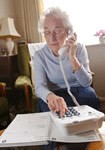Age UK and OFTEC have teamed up to produce a guide to staying warm this winter, specifically for the approximately one million elderly people living in rural areas who rely on costly oil fired heating to heat their homes.
 Bursting with important and useful advice, the guide features tips on how to stay warm and save money as well as information about central heating schemes and grants for the elderly and useful telephone numbers.
Bursting with important and useful advice, the guide features tips on how to stay warm and save money as well as information about central heating schemes and grants for the elderly and useful telephone numbers.
Properties off the gas grid tend to be old and some of the most poorly insulated homes in the UK, and with elderly occupants who are vulnerable to fuel poverty the two organisations are dedicated to helping over-65s keep warm and save money during what remains of the cold winter months.
Excess winter deaths among the elderly are on the rise. In fact, according to figures released by the Office of National Statistics the country saw a 29% growth in excess winter deaths among elderly members of the population in 2012-2013. Of the 31,100 28,500 were people aged over 65.
A report from Age UK has also revealed that around two million elderly people retreat to their beds to keep warm due to their cold homes. A similar number end up heating and living in just one room because they can’t afford to heat their entire house. A higher proportion of over-65s live in the countryside compared to urban areas. Fear of being unable to pay escalating household energy bills is the catalyst for such behaviour among the elderly.
“We’re delighted to work with Age UK on this important project to support older people who live in rural areas and use oil heating. The majority of the one million UK households using oil are located in rural areas, off the mains gas supply, and these properties tend to be older and poorly insulated, making them harder to heat,” said Malcolm Farrow from OFTEC.
OFTEC, which stands for the Oil Firing Technical Association, wants to help as many people as possible save money on oil. Aware that many elderly people wouldn’t have access to their website, they have worked with Age UK to produce a printed guide to try and ensure the message was getting through to as many vulnerable pensioners as possible.


